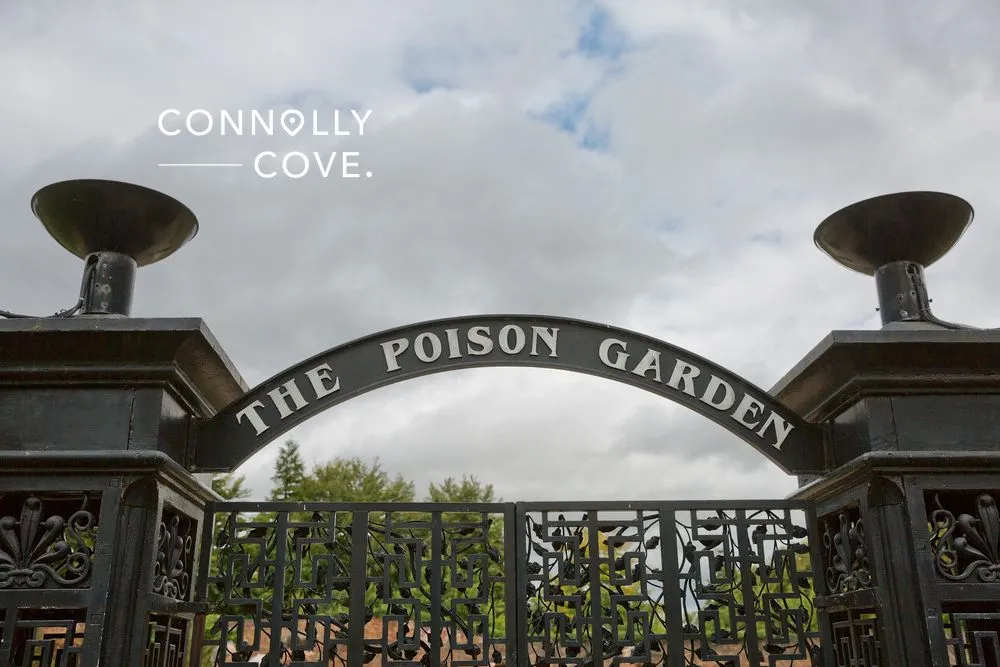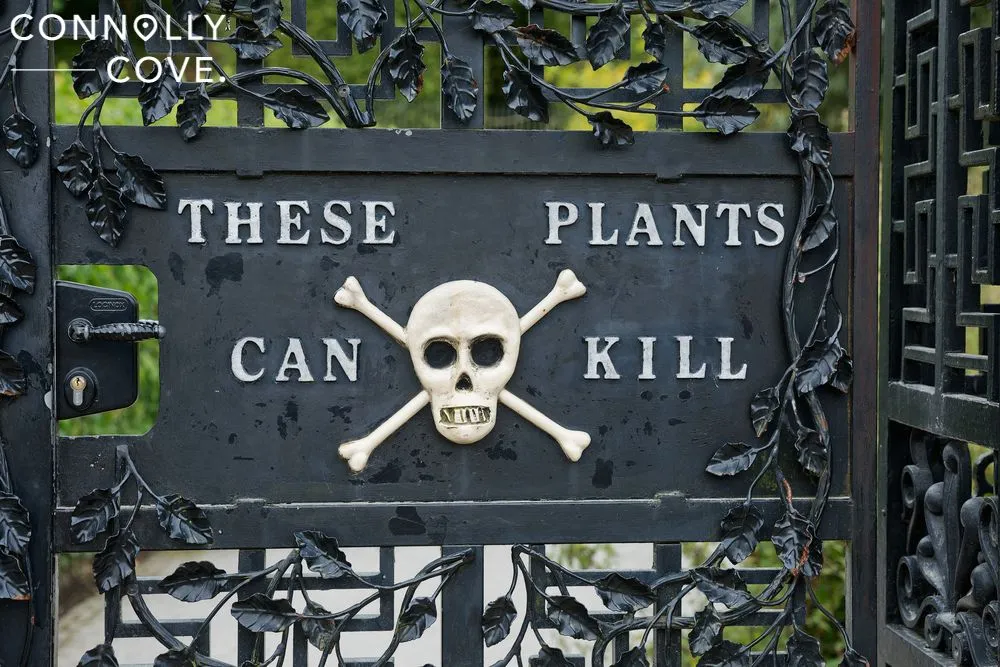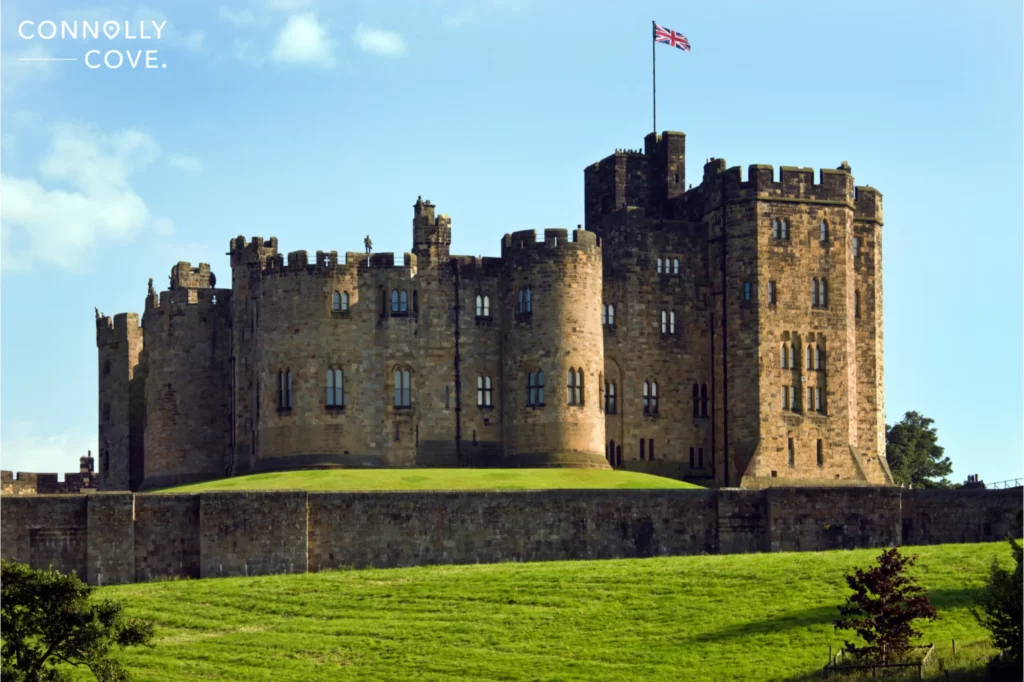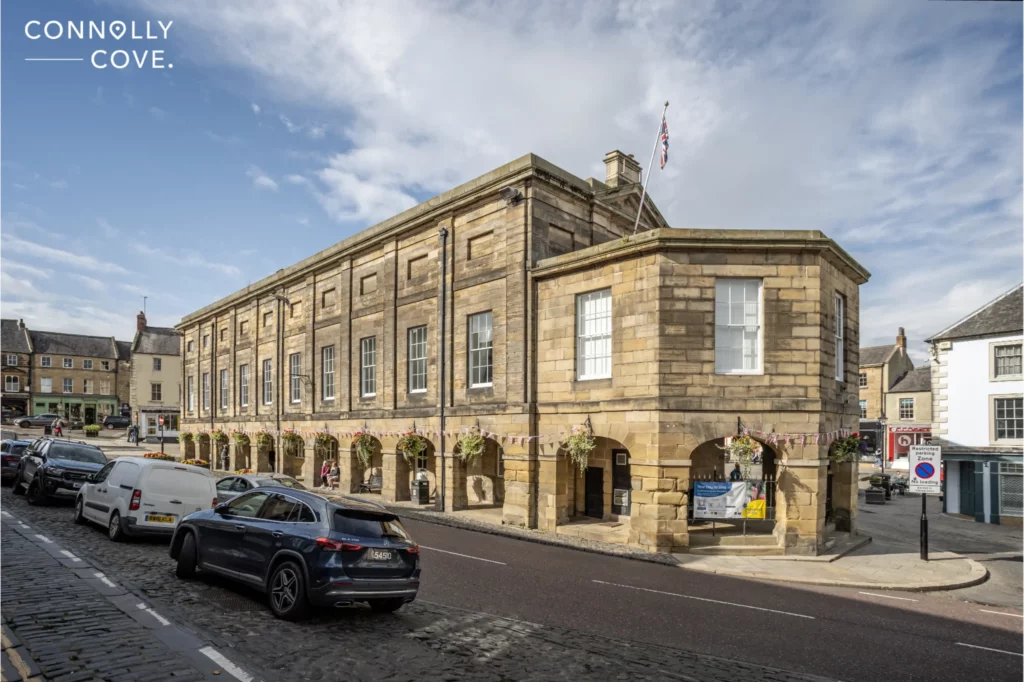Poison Garden, England: Into the Forbidden Blooms

Updated On: December 31, 2023 by Yasmin Elwan
Embark on a botanical journey like no other as we delve into the mysterious allure of England’s Poison Garden. Tucked away within the historic grounds of Alnwick Castle, this unique and controversial garden beckons those daring enough to explore its shadowy secrets.
As the heavy iron gates creak open, a world of toxic beauty unfolds, offering a captivating blend of history, danger, and botanical fascination. Join us as we step into the intoxicating realm of the Poison Garden, where every plant tells a story, and every step unveils the intriguing and sometimes deadly connections between nature and human history.
The Allure of the Poison Garden in England
The Poison Garden’s story is unique. It starts with an English duchess and her love for plants. The Duchess wanted to create a garden unlike any other. She found her inspiration in the botanical gardens of Padua, known for their deadly plants.
With this idea, she started the Poison Garden right next to Alnwick Castle. Despite its dangers, it has over 100 toxic and narcotic species that thrill many visitors each year! Today, it stands behind grand black iron gates as England’s “Most Dangerous Garden”.
The Creation of the Poison Garden
The creation of the Poison Garden in England is rooted in the vision of Jane Percy, the Duchess of Northumberland, who sought to cultivate a garden that would captivate visitors with its dark allure and botanical intrigue.
This unique garden, nestled within the expansive grounds of Alnwick Castle, was conceived in the early 2000s as part of a broader initiative to transform the castle’s gardens into diverse and thematic spaces. The Poison Garden, however, stands out as an unconventional and controversial endeavour. Inspired by historical apothecary gardens and driven by a desire to educate visitors about the dangers of certain plants, the Duchess curated a collection of flora renowned for their toxic properties.
The garden features a carefully curated selection of poisonous plants, ranging from deadly nightshade and hemlock to more obscure specimens like the strychnine tree. Each plant is accompanied by informative plaques that highlight its history, traditional uses, and the dangers associated with it.
The creation of the Poison Garden aligns with the Duchess’s broader mission to blend horticulture with education, encouraging a deeper understanding of the intricate relationships between plants, humans, and historical narratives.
Opened to the public, the Poison Garden offers a one-of-a-kind experience, inviting visitors to explore the beauty and peril concealed within the realm of toxic plants while fostering awareness about their potency and historical significance.
Types of Plants Found in the Garden
The Poison Garden in England is home to a wide variety of dangerous and deadly plants. As you explore the garden, you’ll encounter over 100 infamous killers, such as toxic, intoxicating, and narcotic plants.
These include species like Deadly Nightshade, Hemlock, Foxglove, and Opium Poppy. The garden also features medicinal plants with poisonous properties, like Belladonna and Mandrake. Each plant has its own unique story and intriguing characteristics that will capture your imagination.
Whether you’re fascinated by the dark side of nature or simply curious about the world’s most dangerous plants, the garden offers an unforgettable experience for all who visit.
Visiting the Poison Garden in England

Tickets and prices vary depending on the time of year, but a visit to the Poison Garden is worth every penny. Explore the intoxicating plants and immerse yourself in the allure of danger and mystery.
Information on Tickets and Prices
Admission to The Poison Garden at Alnwick Castle, England, is included in the price of a ticket to the castle. A standard adult ticket costs £19.50 (approximately $25). With this ticket, you can explore the castle and its grounds anytime from 10 am to 3:45 pm, and you won’t have to leave until 5 pm.
Guided tours occur every 30 minutes during the opening hours of the garden, and each tour has a maximum capacity of 20 people. Delve into the history of poison as the guides remind you of some of the world’s most high-profile poison cases.
What to Expect During a Visit
During a visit to the Poison Garden in Alnwick Garden, England, visitors can expect a captivating and unique experience. The garden is only open to guided tours, ensuring that you have expert knowledge about the toxic and dangerous plants found within its boundaries. However, remember that touching or smelling the plants is strictly prohibited for your safety.
Safety Precautions
During your visit to the Poison Garden in England, it’s important to keep safety a top priority. The garden contains highly toxic and dangerous plants, so it’s crucial to follow some safety precautions.
Stay within the designated paths and areas as instructed by your guide. Avoid touching or smelling any of the plants, as they can be harmful or even deadly. It’s also important not to stray from the group during the tour.
Following these safety guidelines will ensure that you have an enjoyable and safe experience exploring this unique and mysterious garden.
Nearby Attractions and Activities
Visitors to the Poison Garden in England can indulge in a plethora of attractions and activities that extend the enchantment beyond the toxic allure of the garden itself.
Alnwick Castle

Nestled in the picturesque Northumberland countryside, Alnwick Castle stands as an iconic testament to centuries of history and medieval grandeur. With roots dating back to the Norman era, this majestic fortress has witnessed the ebb and flow of time, evolving from a military stronghold to a stately residence.
As the seat of the Percy family for over 700 years, Alnwick Castle seamlessly blends architectural splendour with enchanting gardens, making it a captivating destination for history enthusiasts and film aficionados alike. Here’s what you can do there:
- Castle Tours: Immerse yourself in the castle’s rich history with guided tours that lead you through grand state rooms, opulent chambers, and medieval architecture that have stood the test of time.
- Dragon Quest: Embark on a whimsical adventure with the Dragon Quest experience, where visitors, young and old, can uncover the secrets of the castle while engaging in a captivating quest filled with mythical creatures and magical challenges.
- Alnwick Castle Gardens: Explore the breathtaking Alnwick Castle Gardens, a horticultural wonderland that includes the Rose Garden, Poison Garden, and the enchanting Treehouse. The gardens offer a serene retreat with vibrant blooms and innovative landscaping.
- Archery: Channel your inner medieval warrior with archery lessons against the backdrop of the castle grounds.
- State Rooms and Art Collections: Delve into the opulence of the castle’s State Rooms, adorned with exquisite furnishings and priceless artworks. The Percy family’s extensive art collection provides a glimpse into the castle’s illustrious past.
- Broomstick Training: For fans of a certain young wizard, partake in the Broomstick Training experience on the very grounds where scenes from “Harry Potter” were shot, bringing a touch of magic to your visit.
- Special Events: Depending on the time of your visit, enjoy seasonal events, historical reenactments, and themed activities that bring the castle to life in vibrant and entertaining ways.
Alnwick Castle’s allure lies not only in its historical significance but also in the diverse range of activities it offers, providing a captivating experience that seamlessly weaves together the threads of medieval history, magical tales, and natural beauty.
The Treehouse Restaurant
The Treehouse Restaurant is a magical setting nestled within The Alnwick Garden in Northumberland, England. Here, guests can experience enchantment amidst the treetops, surrounded by twinkling lights and hand-crafted wooden furniture.
The restaurant offers modern British menus with a focus on seasonality and local produce. Whether you’re enjoying a cosy lunch or a dinner by a roaring log fire, the combination of excellent service and notoriously good food makes it an unforgettable dining destination.
The Treehouse Restaurant is part of the larger Alnwick Castle complex, which also includes beautiful gardens and historic architecture. If you’re planning a visit, note that you don’t need a garden entry ticket if you’re only dining at The Treehouse.
Alnwick Town

Venture into the heart of Alnwick Town, where the Market Square welcomes you with historic charm and local shops offering unique finds. Stroll through cobbled streets, visit St. Michael’s Church with its medieval tombs, and embrace the cultural scene at the Alnwick Playhouse.
For a deeper dive into Northumberland’s past, the Bailiffgate Museum unveils captivating exhibits. Indulge your taste buds in local pubs and restaurants, savoring the region’s culinary delights. If outdoor pursuits beckon, explore hiking trails and nature walks amidst the picturesque countryside.
Immerse yourself in the multifaceted experiences Alnwick offers, seamlessly weaving together history, nature, and cultural richness. From the grandeur of Alnwick Castle to the quaint charm of its town, this destination invites you to unravel its diverse tapestry at every turn.
Alnwick Bailiffgate Museum
The Bailiffgate Museum & Gallery, located at 14 Bailiffgate, Alnwick NE66 1LX, offers a fascinating journey into the history of Alnwick and North Northumberland. Here’s what tourists can expect when visiting:
- Opening Hours:
- Tuesday to Saturday, and Bank Holiday Mondays: 10 am to 4 pm
- Sundays: 11 am to 4 pm
- Please note that the museum and shop are currently closed for essential maintenance and volunteer holidays. It will reopen at 10 am on Tuesday, January 9, 2024.
- The museum is closed during the Christmas period.
- Admission Prices (Online prices are discounted):
- Adults: £5 (£4.50 online)
- Concessions (Visitors age 65+, students age 17+, people with a disability, and those who are unemployed): £4 (£3.60 online)
- Children aged 5-16: £1 (90p online)
- Under 5s: Free
- Friends Membership:
- Become a Friend and enjoy free entry to the museum for 12 months.
- Attend special premiere events for each exhibition.
- Bring another person or your whole family for free.
- Accessibility and Facilities:
- Wheelchair/pushchair access to all areas.
- Disabled toilet for museum visitors.
- Lift to all floors.
- Standard and accessible toilets.
- Baby changing facilities.
- Large print information sheets available.
- Guide dogs welcome.
- Free Support Pack for those with specific needs.
The Bailiffgate Museum & Gallery invites you to explore its rich exhibits and discover the captivating stories of Northumberland.
Northumberland Coast

The Northumberland Coast unfolds as a breathtaking canvas of natural beauty and rich maritime heritage, stretching along the northeastern edge of England. With its sweeping sandy beaches, rugged cliffs, and captivating dunes, this coastal expanse offers a serene escape for nature enthusiasts and explorers alike.
A designated Area of Outstanding Natural Beauty (AONB), the Northumberland Coast is home to iconic landmarks such as Bamburgh Castle, perched majestically on a rocky outcrop overlooking the North Sea. Visitors can wander along pristine shores, explore charming coastal villages like Seahouses, and witness the Farne Islands, a seabird haven.
The Lindisfarne National Nature Reserve adds to the allure, providing a habitat for diverse bird species and showcasing the region’s commitment to conservation. Whether enjoying a leisurely stroll on the beach, exploring historic castles, or immersing oneself in the vibrant coastal ecosystem, the Northumberland Coast promises a harmonious blend of natural wonders and cultural treasures.
The Poison Garden, hidden within Alnwick Garden, is a realm of peril and allure. Behind black iron gates, over 100 toxic, intoxicating, and narcotic plants thrive. Guides share grisly tales of these botanical assassins. From belladonna to opium poppies, secrets of pain and potency lie here. Remember: look, don’t touch. Amidst beauty, danger lurks—a living testament to life’s fine line.






